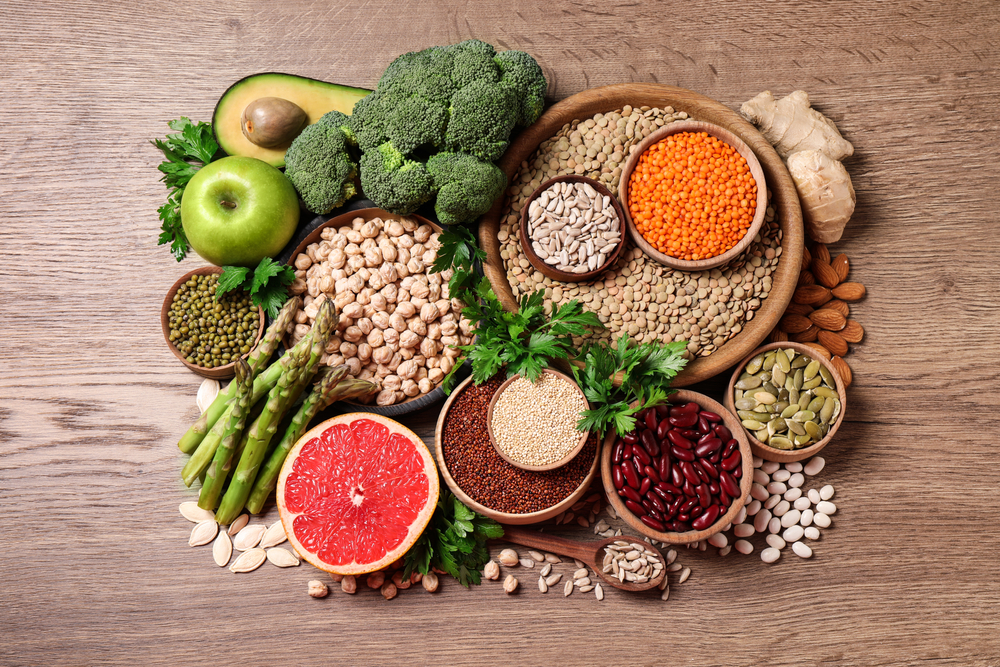In their 40s or 50s, most women in the UK start their menopause. Due to hormonal changes, in particular a fall in oestrogen levels, menstrual periods are less regular and eventually they stop altogether. There are variety of menopausal symptoms, the most common ones are hot flushes and night sweats. Other less common symptoms include psychological problems, vaginal dryness, sleep disturbances, urinary problems and even problems with memory and concentration.
These unpleasant symptoms usually last for about 4-5 years and can be very debilitating for women. The good news is that with a healthy, varied diet and a healthy lifestyle these symptoms can be reduced. Lifestyle changes like stopping smoking and reducing alcohol consumption, increasing physical activity, and maintaining a healthy Body Mass Index, are reported to reduce menopause symptoms. In the long run, these changes can help protect menopausal women from health problems that are associated with lack of oestrogen production, such as osteoporosis and other chronic health conditions.
A varied diet based on starchy foods, including plenty of fruit and vegetables and one that is low in saturated fat, salt and sugar is important for all women, but crucial for women of menopausal age. If this general advice on healthy eating is followed, the risk of cardiovascular disease, osteoporosis and other chronic conditions that are associated with reduced levels of oestrogen can be decreased.
The two main diseases that menopausal women can suffer from are Osteoporosis and Cardiovascular diseases (such as stroke), this article therefore focuses on diets that supplements bone health and promote heart health.
Varied diet and bone health
There are two main nutrients that are linked to maintenance of bone strength and thus, Osteoporosis prevention. These are Calcium and Vitamin D.
An adult should intake at least 700mg of calcium per day, the amount should be consumed from your diet. The products that contain high amounts of calcium are dairy products, such as milk and cheese, boney fish (such as sardines), sesame seeds or breakfast cereals.
For preventing Osteoporosis in women of menopausal age, Vitamin D is another important nutrient as it helps the absorption of calcium from foods. When we are exposed to sunlight during summer months, Vitamin D is produced in our skin, however, between the winter months the sunlight is not strong enough to be able to produce Vitamin D, thus, we heavily rely on dietary sources. The dietary sources of Vitamin D are oily fish, red meat, eggs, and other foods that are fortified with vitamin D. The amount of Vitamin D in foods is low and thus, it is recommended to take Vitamin D as a supplement, especially during winter months.
In addition, it has been shown that women who are at risk of Osteoporosis, such as menopausal women should avoid high consumption of Vitamin A. Vitamin A is mainly found in liver products and women of menopausal age should be cautious of fish liver oil supplements.
Varied diet and heart health
Menopausal women have been shown to have an increased risk of cardiovascular diseases. Various dietary tips have been recommended to reduce the risk of stroke or heart failure some of which include:
-
- Saturated fats should be avoided and replaced with unsaturated fats.
-
- Fish should be consumed twice a week.
-
- Salt intake should be capped at 6g per day.
-
- High-fiber and wholegrain foods, such as wholewheat pasta, vegetables and fruits should be incorporated more in your everyday diet.
-
- Excess drinking of alcohol should be avoided and kept to 14 units maximum per week with several alcohol-free days each week.
Research has indicated that women are prone to gain weight post-menopause, and this is due to physiological and lifestyle changes. With the focus on healthy, varied diet and exercise the risk of cardiovascular diseases will be lower post-menopause.
How can we relieve menopausal symptoms?
Menopausal symptoms can be relieved by varied diet, supplements, and other herbal remedies. Scientists have shown that the use of phytoestrogens (mainly isoflavones and lignans) can alleviate menopausal symptoms as these substances are very similar to oestrogen structure. These substances can be found in soya beans, lentils, chickpeas and of course, fruits and vegetables.
If you have questions about managing symptoms of menopause, and how healthy eating can help, get in touch to book a consultation with one of our team of GPs. They have a special interest in managing the symptoms of the menopause and believe in an integrative approach to supporting women to cope well with their menopausal symptoms.
HRT could be answer for some, but for others lifestyle changes and healthy eating could be the solution.
Written by Barbora Okasova – Physician Associate Trainee
References
Healthy Eating During Menopause (eatright.org)
Exercise, Weight Gain, and Menopause (medscape.com)
Healthy eating and the menopause – British Nutrition Foundation


